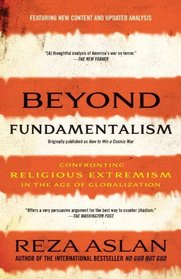I don't read books that I think I will dislike. I had high hopes for Beyond Fundamentalism. But the inescapable conclusion for this one is that it is a piece of unmitigated intellectual dishonesty. Aslan has had three titles for this book, which preface what is confirmed within the book: that Aslan does not have any clear, coherent, consistent thesis (that he's willing to admit to the reader at least). One of the titles includes the subtitle "Confronting Radical Religions". He does this by regurgitating examples of religious violence and extremism that exists in every religion. Nothing original there. The only interesting part is that he spends the majority of the book attacking and ridiculing Jews, Christians, and secularists under the theme of the repression of Muslims. When he does write of Muslim violence, it is strictly and explicitly Sunni Muslim violence. Aslan mention the word 'Shi'a' a total of five times in his book, and every single one is describing the hatred Sunni 'Jihadists' feel for Shi'as. In a book about radical religions, Aslan mentions the word 'Iran' a total of eight times, not one of them actually criticizing any Iranian for radicalism. Did I mention that Aslan is both of Iranian descent and Shi'a? What are the odds that he would attack virtually every other tradition for their religious violence while deflecting and avoiding any and all instances of religious violence from within his own tradition (of which there are numerous examples)?
Aslan couches his rhetoric in liberal and intellectual language, yet he is no liberal and no intellectual (in the sense that he seeks the truth, which has nothing to do with intelligence). His mission is to justify and excuse atrocities done in the name of Islam with the argument "Well they did it too!" Such is an example of Hasib Hussain, one of the '7/7' London bombers that killed over 50 people in 2005. Aslan spends an entire chapter providing the reader with reasons to believe Hussain was confused and had no other choice, mainly due to Hussain's (and every young European Muslim's) "crisis of identity". Aslan does not mention that most teenagers suffer from crises of identity. He does not consider that, for example, gay, disabled, transgender teenagers all over the world suffer from a severe "crisis of identity". Yet they do not often blow up busses. This suggests to me that Aslan's justification's for Hussain's actions are off the mark. He did not write one word of condemnation of Hussain or his actions. Yet, in the same chapter, he blasts "neofascist' European politicians, "pseudointellectual" critics of Islam such as Aayan Hirsi Ali, a blatantly "Nazi" political party in Britain, and endorses religious violence as being good for social movements (although Jihadism takes it too far).
Aslan markets himself as the go-to modern, liberal, Muslim 'intellectual'. But Islam does not need his dishonest defense; he does more harm than good. The world is more than able to see that the majority of Muslims are a beautiful, generous, fascinating people without the dishonesty of Reza Aslan.
NOTE
Beyond Fundamentalism Confronting Religious Extremism in the Age of Globalization
Author: Reza Aslan
also published under the title:
How to Win a Cosmic War Confronting Radical Religions Reza Aslan
Aslan couches his rhetoric in liberal and intellectual language, yet he is no liberal and no intellectual (in the sense that he seeks the truth, which has nothing to do with intelligence). His mission is to justify and excuse atrocities done in the name of Islam with the argument "Well they did it too!" Such is an example of Hasib Hussain, one of the '7/7' London bombers that killed over 50 people in 2005. Aslan spends an entire chapter providing the reader with reasons to believe Hussain was confused and had no other choice, mainly due to Hussain's (and every young European Muslim's) "crisis of identity". Aslan does not mention that most teenagers suffer from crises of identity. He does not consider that, for example, gay, disabled, transgender teenagers all over the world suffer from a severe "crisis of identity". Yet they do not often blow up busses. This suggests to me that Aslan's justification's for Hussain's actions are off the mark. He did not write one word of condemnation of Hussain or his actions. Yet, in the same chapter, he blasts "neofascist' European politicians, "pseudointellectual" critics of Islam such as Aayan Hirsi Ali, a blatantly "Nazi" political party in Britain, and endorses religious violence as being good for social movements (although Jihadism takes it too far).
Aslan markets himself as the go-to modern, liberal, Muslim 'intellectual'. But Islam does not need his dishonest defense; he does more harm than good. The world is more than able to see that the majority of Muslims are a beautiful, generous, fascinating people without the dishonesty of Reza Aslan.
NOTE
Beyond Fundamentalism Confronting Religious Extremism in the Age of Globalization
Author: Reza Aslan
also published under the title:
How to Win a Cosmic War Confronting Radical Religions Reza Aslan




![header=[] body=[Get a free book credit right now by joining the club and listing 5 books you have and are willing to share with other members!] Help icon](/images/question.gif?v=52444873)
